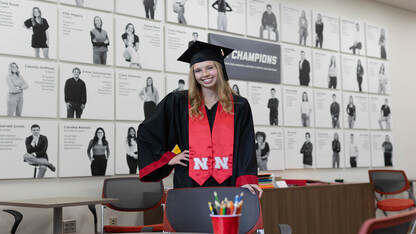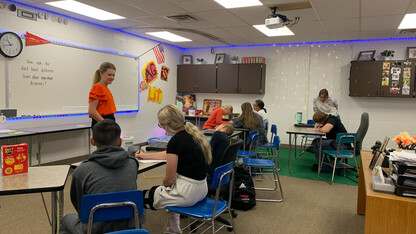
Nanomaterials, nanotechnology, nanohybrids - what’s the big deal about nano?
Nebraska EPSCoR, UNL’s Materials Research Science and Engineering Center and the Nebraska Center for Materials and Nanoscience will begin to answer these questions at NanoDays, 1 to 4 p.m., April 2 at Westfield Gateway Shopping Center. UNL faculty, staff, and students and Lincoln Public Schools educators will present games and activities that demonstrate the special and unexpected properties found at the nanoscale and the promise that nanoscience holds for transforming our daily lives.
NanoDays bring university researchers together with science educators to create unique new learning experiences for both children and adults to explore the miniscule world of atoms, molecules, and nanoscale forces. Visitors will investigate liquid crystals, forces stronger than gravity, and sand that doesn’t get wet - even under water. Other activities include using your nose as a nanodetector and measuring yourself in nanometers.
NanoDays is organized by the Nanoscale Informal Science Education Network and takes place nationally from March 26 through April 3. This community-based event is the largest public outreach effort in nanoscale informal science education and involves science museums, research centers, and universities from Puerto Rico to Alaska.
Research at a nano level is done in many areas including physics, chemistry, material sciences, engineering, biology, and medicine. Nanoscientists study and make new applications that improve computers, medical treatments, energy efficiency and more. MRSEC and NCMN are on the forefront of research in one of the highest-priority national programs, the National Nanotechnology Initiative. Nebraska EPSCoR administers National Science Foundation awards that support nanomaterials research at UNL and other colleges and universities across Nebraska.
MRSEC at the University of Nebraska is one of a nationwide network of MRSEC’s sponsored by the NSF, and are centers of excellence that support interdisciplinary materials research and education of the highest quality in our nation. NCMN is a multidisciplinary organization that supports more than 85 faculty members from UNL and other University of Nebraska campuses working in the nanoscience area. The center also partners with state and national industries to promote economic development.
EPSCoR is the Experimental Program to Stimulate Competitive Research, established by Congress to support science, mathematics and technology research, infrastructure, and education in states that receive disproportionately lower amounts of federal research funding. Since 1991, Nebraska has received more than $251 million from federal EPSCOR/IDeA programs to support transformative research and workforce development.







